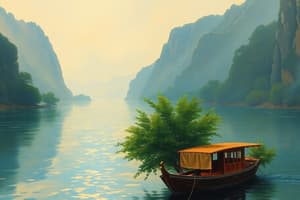Podcast
Questions and Answers
What refers to the continuous movement of water on, above, and below the surface of the Earth?
What refers to the continuous movement of water on, above, and below the surface of the Earth?
- Hydraulic cycle
- Carbon cycle
- Hydrologic cycle (correct)
- Nitrogen cycle
What is the process by which water from bodies of water and the Earth's surface turns into water vapor?
What is the process by which water from bodies of water and the Earth's surface turns into water vapor?
- Infiltration
- Condensation
- Precipitation
- Evaporation (correct)
What happens when clouds are forced to rise and reach a point where the temperature drops?
What happens when clouds are forced to rise and reach a point where the temperature drops?
- Evaporation
- Precipitation
- Condensation (correct)
- Infiltration
Which of the following is NOT a process in the water cycle?
Which of the following is NOT a process in the water cycle?
What is the main function of rivers in Earth's hydrologic cycle?
What is the main function of rivers in Earth's hydrologic cycle?
Apart from transportation, what other function do rivers serve in Earth's ecosystem?
Apart from transportation, what other function do rivers serve in Earth's ecosystem?
What is the primary role of oceans in the global climate system?
What is the primary role of oceans in the global climate system?
Which of the following best describes the movement pattern of glaciers?
Which of the following best describes the movement pattern of glaciers?
In geography, what do aquifers primarily store?
In geography, what do aquifers primarily store?
Which glacier is not mentioned as one of the famous glaciers in the text?
Which glacier is not mentioned as one of the famous glaciers in the text?
Why does replenishing aquifer resources take thousands of years?
Why does replenishing aquifer resources take thousands of years?
Flashcards are hidden until you start studying
Study Notes
Geography: Water Cycle, Rivers, Oceans, Glaciers, Aquifers
Geography is the study of Earth's physical features and political divisions, including its atmosphere, hydrosphere, lithosphere, and population distribution. This article explores key aspects related to water movement and storage within Earth's geographic framework, focusing on the water cycle, rivers, oceans, glaciers, and aquifers.
Water Cycle
The water cycle, also known as the hydrologic cycle, refers to the continuous movement of water on, above, and below the surface of the Earth. This cycle consists of several processes: evaporation, condensation, precipitation, infiltration, and runoff. Evaporation occurs when water from bodies of water and the Earth's surface heats up, turning it into water vapor. This vapor rises and cools, forming clouds through the process of condensation. When these clouds are forced to rise and reach a point where the temperature drops, precipitation occurs in the form of rain, snow, or sleet. The precipitation then either infiltrates the soil and becomes groundwater, evaporates into the atmosphere, or runs off into rivers and eventually the oceans.
Rivers
Rivers are important parts of the Earth's hydrologic cycle. They transport water from the land to the ocean, provide habitats for various species, and are used for various human activities such as transportation and irrigation. Some of the world's longest rivers include the Nile, Amazon, and Yangtze. Additionally, rivers can also be categorized by their drainage basins, which are the areas of land that drain into a particular river or lake. For example, the Mississippi River has a drainage basin covering parts of Canada and the United States.
Oceans
Oceans are vast bodies of saltwater that cover about 70 percent of the Earth's surface. They play a crucial role in global climate, serving as the primary site for heat exchange between different regions of the planet. Additionally, oceans contain a large portion of Earth's species, both in terms of number and biomass. Major ocean currents include those in the Atlantic Ocean, Pacific Ocean, Indian Ocean, Southern Ocean, and Arctic Ocean. These currents help distribute heat around the world and contribute to weather patterns.
Glaciers
Glaciers are large accumulations of ice that form over long periods of time. They can be found in mountainous areas, such as the Himalayas, Andes, Rockies, Alps, and Scandinavian Mountains. Glaciers move downhill due to gravity, scraping rock along their base and creating distinctive landforms called moraines. Some famous glaciers include the Franz Josef Glacier in New Zealand, Aletsch Glacier in Switzerland, and Vatnajökull Glacier in Iceland.
Aquifers
An aquifer is a layer of soil, sand, gravel, or rock that contains enough water to yield significant quantities of water to wells. Aquifers store groundwater, which can be extracted and used for various purposes, such as public supply, agriculture, and industry. However, replenishing these resources takes thousands of years. Some examples of major aquifers include the High Plains aquifer, which stretches from Texas to South Dakota, and the North China Plain aquifer system, which provides about 60 percent of Beijing's water.
Geography thus intertwines physical landscapes, human activities, and natural processes, offering insights into the intricate ways water moves and sustains life on Earth.
Studying That Suits You
Use AI to generate personalized quizzes and flashcards to suit your learning preferences.




